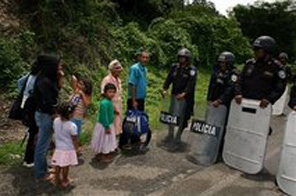Zelaya establishes border camp
OCOTAL: Ousted President Manuel Zelaya encamped his roving government in exile in this sleepy mountain town near the Honduran border Sunday to launch his return to power after a coup last month.
After weeks of shuttling between Central America and Washington, Zelaya said he has no plans to leave the border region, despite a U.S. State Department spokesman saying he would arrive Tuesday in Washington to restart negotiations with the interim government that deposed him.
"If someone wants to talk to me, let them come here to Ocotal," Zelaya said.
He drew throngs of supporters and locals curious about the celebrity who has brought world attention and international media to a town of 35,000 just 15 miles (25 kilometers) from the Honduran border.
Teenagers riding two to a bicycle, wrinkled coffee farmers, a shoeshine boy, a young mother and child all gathered to catch a glimpse of the now-famous politician in the white cowboy hat.
Some were star-struck.
"I think he's handsome," said Nimia Salinas Inestrosa, 23, who works at a vegetable stand with her mother.
But his presence threatened to divide Nicaraguans as well. This town of two traffic lights suffered heavily during the 1980s Contra war, when U.S.-backed rebels attacked the Sandinista government.
Nicaragua's opposition Liberal Constitutionalist Party issued a statement Sunday calling Zelaya's actions "a threat to the peace, tranquility and friendship" between the two countries.
Leftist President Daniel Ortega's ruling Sandinista party has championed Zelaya's cause.
"What I'm starting to realize is that he has some problems in Honduras," said Jose Santo Ochoa, 66, who had to abandon his nearby coffee farm when it became a war zone in the 1980s. "It would be better to see him be the loser and look for a peaceful solution."
The deposed president maintained his two-front campaign to pressure his country's interim government through civil disobedience, while urging the international community to slap tougher sanctions on coup leaders, who have been criticized worldwide for using the military to whisk a democratically elected leader out of the country on June 28.
Washington has already suspended more than $18 million in military and development assistance. The European Union has frozen $92 million in development aid.
U.S.-backed talks led by Costa Rican President Oscar Arias broke down last week when Honduras' interim government said it won't allow Zelaya to return as president under any circumstances. It has vowed to arrest him if he sets foot in his homeland on four charges of violating the constitution.
All charges stem from Zelaya ignoring a Supreme Court order and attempting to hold a vote asking Hondurans if they want a special assembly to rewrite the constitution the day he was ousted.
Zelaya made a brief, symbolic trip a few meters (yards) into Honduran territory on Friday, turning back without being confronted.
The Honduran military thwarted Zelaya's first attempt to return home July 5 by blocking his airplane from landing at the airport in the capital, Tegucigalpa.
Zelaya now stays at a local hotel and zips about in a convoy of white Jeeps and SUVs trailed by television cameras.
He said Sunday that nearly 1,000 Hondurans arrived in the past 24 hours, crossing the border on foot through the mountains to avoid roadblocks and patrols set up by the interim government to thwart Zelaya's return.
There was no way to independently confirm the estimate.
At one point Sunday, Zelaya strode into a throng outside his hotel, sat on the hood of a car and held up a voter ID card in one hand.
"With this weapon we are going to overthrow the dictatorship," he cried through a bullhorn.
Supporter Jose Bernabe spent the time somewhat more prosaically, sleeping at a makeshift shelter where dozens of Zelaya followers spent the night on a concrete slab under a tin roof.
Bernabe, a 56-year-old Honduran coffee farmer from Villa Santa, said he hiked across the border with four brothers to join Zelaya.
He lined up with others for a breakfast of hot-dog buns and butter, preparing to head for the border to greet other Hondurans entering Nicaragua to support Zelaya's return.
"Here in Nicaragua we feel free. In Honduras we feel repressed," he said.
The Honduran Red Cross took thousands of water rations to the area where the army and police have set up roadblocks to keep Zelaya supporters from reaching the border.
In Tegucigalpa, relatives held a funeral for a young Zelaya supporter found stabbed to death Saturday in a field near El Paraiso, the border town on the Honduran side. Both the Honduran police and army denied any responsibility in his death.
Honduran farmer Edgar Egiguren, 21, said he still hoped the president would cross back into Honduras after two aborted attempts.
"The army won't let him past there," Egiguren said. "That's OK. He can't cross yet because we don't have enough people."
Other supporters wondered how long Zelaya could hold the world's attention from his outpost.
"He shouldn't let this turn into a show," said Cesar Omar Silva, who writes a pro-Zelaya newsletter. "The journalists aren't going to be able save him from the bullets. And as soon as the interim government captures him, any trace of him will disappear."






